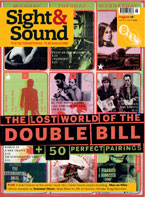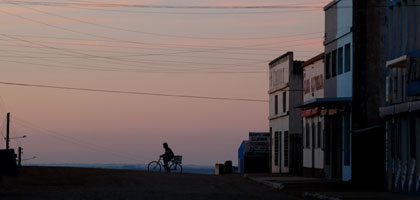
Bottom of the heap
Film of the Month: El baño del Papa

The Pope's visit to a small town in Uruguay inspires unlikely get-rich-quick schemes among the locals in Fernández and Charlone's understated comedy about crime and catering. By Michael Brooke
Uruguayan cinema was all but unknown in Britain when Juan Pablo Rebella and Pablo Stoll's wry, low-key Whisky (2004) broke out of the festival circuit to achieve a modest commercial release. El baño del Papa (The Pope's Toilet) offers many of the same pleasures, but while the earlier film stuck rigorously to a Kaurismäkiesque minimalism in both dialogue and mise-en-scène, the newer film is more expansive and much closer in tone and content to Luis García Berlanga's Welcome, Mr Marshall! (1953), one of the acknowledged classics of Spanish-language cinema. If it plays like a more realistic spin on Berlanga's masterpiece, El baño del Papa's basis in fact (the Pope's 1988 visit to Uruguay) absolves it from the charge of slavish imitation.
El baño del Papa is set primarily in north-eastern Uruguay, in the town of Melo whose only real advantage is its proximity to the border. Beto and his friends Valvulina and Tica perform daily smuggling runs to and from the Brazilian town of Aceguá which is about 40 miles away - no small distance to travel on a rickety bicycle with a dodgy chain. To get back into Uruguay, the smugglers must either confront customs men Alvarez and Luna or avoid the border post entirely. The second course involves a perilously bouncy journey over rough terrain (both Beto's bike and his knee suffer at various points) and a possible encounter with mobile patrolman Meleyo.
If the plot sounds like a Latin-American version of Whisky Galore, it soon becomes clear that Beto and his friends are acting out of necessity rather than libertarian instinct. Given their lack of employable skills and the run-down state of the local economy, smuggling is their only realistic means of scraping a living. So when Pope John Paul II announces that Melo will be a stop on hisSouth-American itinerary, the locals are fired up by the television announcer's prediction that vast numbers of wealthy Brazilians will flood into the town and spend lots of money. In a running gag the estimate of the anticipated crowd increases with each broadcast, rising from 30,000 to 200,000.
The Pope's visit is the opportunity of a lifetime for the citizens of Melo and leads to an outbreak of entrepreneurship among Beto's friends and neighbours, many of whom take out clearly unrepayable loans or sell vital assets in order to invest in barbecues, meat grinders and candy-floss machines. Apart from a sceptic on television who correctly predicts that the event will be a commercial flop, the sole voice of reason in the town is Beto's wife Carmen, a woman so devout that she crosses herself at the sound of church bells. However, although she believes that cashing in on the Pope's visit is sinful, she too is swept up in the town's euphoria as Beto's scheme takes hold.
Beto's big idea, which supplies the film with its title, is that while everyone else caters for one end of the feeding frenzy, he'll deal with the other by opening a public lavatory in his front yard and charging people for its use. In a very funny scene he painstakingly trains Carmen and his daughter Silvia in their roles, which involve providing washing facilities and collecting the money, discreetly flushing with the aid of a bucket and even knocking on the door after a statutory two minutes to hurry up the occupant and keep the expected queue moving. As its lack of a built-in flush indicates, Beto is constructing the toilet on the cheap, and he resorts to taking on more cross-border runs to earn sufficient funds and buy morecost-effective materials.
The broad comedy of Beto's scheme propels the film's narrative, but there are many subtler touches to admire as well. The town's numerous hierarchies are defined by material advantage (a smuggler with a motorcycle gets the best jobs) and racial identity (Valvulina, who is black, reflects that even if his food stall makes him rich, he'll still be low in status). Everyone is corruptible, including the authority figures who delight in humiliating Beto and his friends.In desperation, Beto ends up running errands for the widely loathed Meleyo and is so ashamed that he lies about it to his family.
The film portrays religion as a mass-media construct that offers little practical assistance to the poor, but offsets the radicalism of this notion with a conservative affirmation of the deeper bonds between family and friends.
Despite these ties, Beto and Carmen argue endlessly about their daughter's future. Beto wants her to join him on his smuggling runs (the family 'business'), while Carmen wants her to become a seamstress. They both dismiss Silvia's own ambition of becoming a reporter as a teenage fad even though she takes it seriously enough to rehearse reports (complete with commercial-break announcements) with the aid of a fake microphone. However Silvia gradually becomes aware that her beloved broadcasters are turning poorly researched rumour into a story which has the power to ruin people's lives.
Even the television reporter acknowledges the sketchiness of his information when he admits on air that a predicted ten-kilometre line of people waiting to see the Pope might not exist. His report concludes with a plea: "If anyone is listening in Aceguá, could they let us know?”
Like Whisky, El baño del Papa credits two directors: the writer Enrique Fernández and the cinematographer César Charlone who has worked on co-producer Fernando Mereilles' directorial projects (including 2002's breakthrough City of God and this year's Blindness). Here Charlone generally eschews his customary visual flamboyance in favour of a dusty, grainy realism. The camera moves almost constantly, either hand-held in the smaller-scale scenes or keeping pace with the cycling smugglers as they dodge the authorities or simply race each other to keep their spirits up. The film's brief foray into slow-motion towards the end is justified by the context: as the numbed stallholders contemplate the disastrous reality of just 8,000 visitors turning up, and look into a bleak and hopeless future, only the scrawny dogs loping along the dirt-caked streets have reason to be grateful to the Pope as they feast on the plentiful leftovers.
The cast is largely non-professional, the major exception being César Troncoso's Beto who has played supporting roles in Guillermo Casanova's El Viaje hacia el mar (2005) and Lucía Puenzo's XXY (2007). He's in almost every scene, his droopy moustache and occasional bouts of black despair offset by moments of irrepressible enthusiasm; the film concludes with his Italian Job-style declaration, "I've got an idea!"As Beto's increasingly weary wife, Virginia Méndez has a touch of Carmen Maura about her, both in appearance and general demeanour, while Virginia Ruiz's portrayal of Silvia's struggle with the conflicting demands of personal ambition and family loyalty is outstanding. Towards the end of the film, she sheds a single tear as she realises her role model the TV reporter is ultimately responsible for the disaster, before running to catch up with her father and walk by his side. As with many similar observations in this quietly understated gem, the detail is heartbreaking, as much for the emotions it only hints at as for the poignancy of the moment itself.
